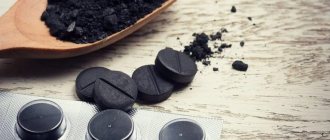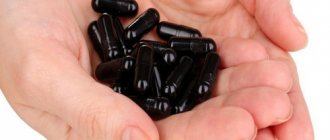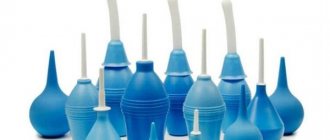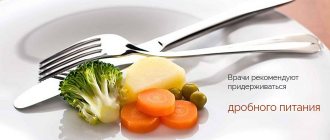Activated charcoal for nausea quickly removes the symptoms of poisoning and significantly reduces or completely eliminates discomfort, vomiting, and general weakness.
Studies have been conducted to examine whether activated charcoal helps with nausea in any pathology. The results proved that the sorbent is effective against toxic infections, poisoning, and intestinal infections with pathogenic microbes. Using activated charcoal for vomiting has a good effect. In acute cases, the drug is used for gastric lavage as a means of emergency treatment, and in the future - to reduce intoxication. The medicine quickly binds the remains of poison and toxins in the lumen of the entire digestive tract.
Main causes of nausea
To effectively treat any disease, it is necessary to find out its cause, and nausea is no exception. It is always a signal of some pathological process in the body and does not appear on its own.
The most common causes of nausea and vomiting:
- food poisoning;
- gastrointestinal diseases (gastroesophageal reflux, intestinal infection, stomach ulcer, Crohn's disease, hepatitis, pancreatic or stomach cancer, celiac disease, high acidity of gastric juice);
- intoxication due to chemical poisoning;
- toxicosis during pregnancy;
- seasickness;
- diseases of the central nervous system (hydrocephalus, migraine, encephalitis, meningitis, meningioma, malignant brain tumor);
- heart disease (heart attack, heart failure);
- foreign objects entering the stomach;
- side effects of taking various medications, including anesthetics and muscle relaxants;
- mental disorders (severe depression, anxiety neurosis);
- eating disorders (anorexia, bulimia);
- sun and heatstroke.
As you can see, many acute and chronic diseases, and not only of the digestive system, are accompanied by nausea. Gastrointestinal tract infections and food poisoning are most often the cause of this unpleasant sensation. Poisoning, in addition to nausea, is usually accompanied by vomiting and severe pain in the stomach.
With neurological disorders and severe diseases of the digestive system, chronic nausea is observed, which is sometimes accompanied by vomiting.
When application is ineffective
Correct use is associated not only with the dosage of the drug, but also with assessing the severity of the condition of the victim from intoxication
The effectiveness and efficiency of activated carbon is negligible if vomiting and nausea are not associated with food or poisoning.
The drug is not used for the following conditions:
- gestosis of pregnant women in late stages;
- acute appendicitis;
- migraine, chronic headaches associated with high blood pressure, increased intracranial pressure;
- intoxication caused by viral or bacterial diseases;
- chronic pathologies of the kidneys and liver;
- exacerbation of cholecystitis;
- history of pancreatitis.
Often, nausea or vomiting is a harbinger of myocardial infarction, a clinical picture of an “acute abdomen” with peritonitis, overheating or sunstroke, or hypertension. If severe discomfort occurs, associated with vomiting, sweating and cooling of the skin, as well as fainting, the patient should be kept at rest and an ambulance should be called.
How charcoal helps with nausea
An Activated Carbon tablet has many small pores into which toxins enter as the drug moves through the gastrointestinal tract. Toxins, poisons and harmful bacteria are retained by the drug until it is naturally eliminated from the body. If nausea is caused by intoxication, then Activated carbon is one of the best ways to combat it - the drug is absolutely natural and has a minimum of contraindications. Due to the safety of the drug against nausea and vomiting, activated carbon can be taken by pregnant women and children.
Use of adsorbent for poisoning in a child
Does activated charcoal help a child with nausea and vomiting caused by poisoning? Yes, it helps. In addition, the drug can be prescribed for other gastrointestinal pathologies accompanied by similar symptoms.
It must be remembered that the drug is not prescribed to children under one year of age. Admission is possible only in exceptional cases and only on the recommendation of the observing pediatrician.
Before giving the child a tablet, it must be crushed and diluted in a small amount of water. It will be easier for him to drink the resulting suspension and it will begin to “work” much faster than a full tablet. At the pharmacy you can purchase a format of the drug intended specifically for dilution in water - paste, granules or powder.
Activated carbon can be used in children over one year of age without a doctor’s prescription, but not for longer than three days.
The dosage of activated carbon depends on the weight and age of the child. So, children at the age of 7 are prescribed 5 grams of activated carbon, divided into three doses.
If a child needs to be treated with other medications, then at least two hours should pass between taking activated charcoal and the next drug. Otherwise, they will be removed by the adsorbent without having the desired therapeutic effect.
The maximum period for using activated carbon without a pediatrician’s recommendation is no more than 3 days. It is important to remember that while taking the drug, the child’s stool turns black - this is a physiological norm that does not require treatment.
Instructions for use of the drug for nausea in childhood
Activated charcoal for nausea in childhood must be given following certain instructions:
- The dosage of the drug is calculated based on the child’s weight, adhering to the ratio: 1 kg of body weight – 0.05 grams of the drug. The resulting norm is divided into 3 doses;
- maximum single dosage – no more than 0.2 grams per 1 kg of weight;
- The duration of treatment depends on the general condition of the baby. For acute intestinal pathologies - no more than 5 days. During the period of exacerbation of a chronic disease or the development of an allergic reaction - no longer than 2 weeks;
- a repeat course can only be prescribed by the attending physician.
How to take charcoal for nausea
In case of poisoning
Activated carbon helps against nausea caused by alcohol poisoning, poor-quality food and medications. You need to take the drug 3 times a day with boiled water. The number of tablets for one dose for both children and adults is determined by body weight: 1 tablet per 10 kg of weight.
The course of treatment for poisoning is usually 3-5 days . At this time, it is important not only to take charcoal, but also to follow a diet that includes avoiding all foods that can irritate the stomach (alcohol, spices, carbonated drinks, fried and fatty foods) and drinking plenty of fluids. After a course of treatment, you may need to take probiotics to restore intestinal microflora
In case of acute intoxication, activated carbon can be used for gastric lavage. To do this, you need to take 20 g of Activated Carbon during the day, washing down the tablets with 250 ml of non-hot boiled water.
Taking Activated Charcoal 1.5 hours before drinking alcohol in the amount of one tablet per 10 kg of weight will help reduce the negative effect of ethyl alcohol on the liver and significantly alleviate hangover symptoms.
For intestinal infections
Many people, suspecting they have an intestinal infection, start drinking activated charcoal for nausea. Despite the fact that this drug effectively removes toxins from the body, it is not always advisable to use it for intestinal infections.
Coal does not have antibacterial properties, and together with some pathogenic bacteria, it will remove beneficial substances from the body, primarily vitamins and minerals, as well as liquid. This can worsen the patient’s condition, lead to dysbiosis, dehydration, and painful weight loss. That is why, if you suspect an intestinal infection, you should consult a gastroenterologist before taking any medications.
For intestinal infections, antibiotics are often prescribed that effectively fight bacteria, and charcoal and other sorbents can only be taken with the permission of a doctor. Activated carbon sharply reduces the effectiveness of other medications, so it can be taken only 2 hours after taking the antibiotic and only in the dosage specified by the doctor.
Features of the drug
The drug has a pronounced porous structure, which explains the natural ability to neutralize toxic substances. Absorbing properties are due to the binding of pathogenic molecules (toxins, bacteria, waste, infectious agents) and retention of them in porous cells.
Due to its absorbent effect, activated carbon should be taken in the following conditions:
- food and alcohol poisoning;
- infection by microbes, viruses;
- allergic reactions;
- poisons, heavy metal deposits;
- chronic intoxication caused by impaired renal and liver function.
Neutralization of toxic pathogenic particles occurs 4-6 hours after using the drug, therefore, with sharply increasing symptoms, activated carbon is simply ineffective.
In case of poisoning
Nausea and vomiting are serious symptoms indicating various poisonings. Here it is important to understand the rate of growth of signs. For example, when poisoned by mushroom toxins, nausea and vomiting are associated with a sharp deterioration in the condition.
In case of mild poisoning, the remedy can bring noticeable improvement within a few hours. In severe cases, patients require urgent hospitalization. Activated carbon helps against nausea and vomiting only in mild cases of intoxication.
For gastritis and peptic ulcers
Exacerbation of inflammatory pathologies of the gastrointestinal tract is often accompanied by vomiting or nausea.
The absorbent helps relieve unpleasant symptoms and eliminate heartburn due to the following properties:
- elimination of toxins from stagnant food bolus with reduced acidity of gastric secretions;
- neutralization of the aggressive effects of hydrochloric acid at high acidity.
The absorbent in these cases is an emergency aid, and not the main drug for the treatment of vomiting or nausea. When using medications for vomiting, it is important to correctly assess the degree of potential symptomatic threat.
Is Activated Charcoal Always Effective for Nausea?
Activated charcoal is not a panacea for nausea and vomiting. This sorbent helps well if nausea is caused by food poisoning, drug intoxication, or certain chemicals (methyl alcohol, silicates, etc.). Activated charcoal is also effective for nausea caused by alcohol poisoning.
Often pregnant women use activated carbon when nausea occurs, based on the fact that this drug contains only natural ingredients and does not harm the fetus in any way. However, since nausea and vomiting in the early stages of pregnancy are caused not by intoxication, but by general stress in the body against the background of hormonal changes, charcoal will not help eliminate the symptoms of toxicosis.
For diseases of the central nervous system, heart disease, mental disorders, as well as gastroesophageal reflux, dyspepsia, neoplasms in the stomach and pancreas, taking enterosorbents will not relieve such unpleasant symptoms as nausea and vomiting.
Moreover, for some gastrointestinal diseases, taking Activated Carbon can do more harm than good. For example, if you have a stomach ulcer or gastric bleeding, you should absolutely not take charcoal. This also applies to the ingestion of acids, alkalis and salts of hydrocyanic acid (cyanides) into the body - if poisoned by these substances, you should not take any enterosorbents, including activated carbon.
That is why, before starting to treat nausea with charcoal, you need to accurately determine the cause of poor health.
Nausea and vomiting: common pathological causes of poor health
The appearance of nausea and vomiting is not an independent disease. These are symptoms of a certain pathology. Therefore, before starting therapy, it is necessary to clarify the cause of this condition.
Most often, such symptoms accompany diseases of the digestive tract. These are also the main signs:
- various poisonings (poor food, toxins, poisons, drugs),
- intestinal infection.
In such conditions, the use of activated carbon immediately after the onset of symptoms is reasonable and effective.
In pathologies of the digestive organs, such manifestations are expressed in acute conditions. But they can be disturbing in case of decompensation of the chronic course of the disease. Disturbances in the form of nausea and vomiting appear with the following diseases:
- hypo- and hyperacid gastritis,
- pancreatitis,
- cholecystitis,
- hepatitis of various etiologies with significant impairment of liver function.
In these cases, the use of carbon sorbent will alleviate the condition. If there is a deterioration in health, a doctor’s examination, examination and full comprehensive treatment taking into account the identified pathology are necessary.
Activated carbon should not be taken on its own if the patient has suffered from severe gastrointestinal diseases for many years:
- peptic ulcer,
- dysfunction of the digestive system in the form of constipation,
- partial intestinal obstruction,
- nonspecific ulcerative colitis.
The condition in such cases can worsen significantly, even to the point of bleeding. Causes of feeling unwell with nausea and vomiting include an acute abdomen.
Nausea and vomiting can accompany severe pathology from the cardiovascular and other systems:
- hypertensive crisis,
- a sharp drop in blood pressure,
- myocardial infarction,
- hypoglycemic conditions,
- motion sickness in transport,
- toxicosis of pregnant women,
- disruption of the central nervous system (severe migraine, cerebral edema, head injuries).
If nausea or vomiting is suspected to have occurred due to the above situations, taking the enterosorbent is contraindicated. The cause can be determined by accompanying clinical signs. If you have pathology of the digestive system, you may experience abdominal pain, diarrhea or constipation. Diseases of other organs are accompanied by headaches, there may be a lack of coordination of movements, blurred vision or spots before the eyes, severe sweating, tremor of the fingers, and more. When measuring blood pressure, a sharp increase in blood pressure will be detected, tachycardia during hypertensive or sympathoadrenal crisis, or low blood pressure numbers with bradycardia during vagotonic or hypoglycemic conditions.
The appearance of dyspepsia is a sign that the patient’s condition is worsening. These symptoms lead to dehydration and loss of electrolytes. Metabolic alkalosis develops, increasing intoxication. As a result, nausea and vomiting increase.
Activated charcoal for vomiting
People often try to get rid of vomiting with the help of Activated Charcoal, knowing that it quickly eliminates the symptoms of intoxication. However, if vomiting is not caused by poisoning, there is no point in taking Activated Charcoal . The cause of vomiting may be a neurological disorder (migraine, motion sickness, hydrocephalus), gastrointestinal disease (peritonitis, appendicitis, gastroenteritis), bulimia, or simply severe stress.
One of the possible causes of vomiting in young children is a foreign object entering the stomach. Then the doctor decides whether it is possible to take Activated Charcoal when vomiting. Usually, if the object is small and not sharp (a button, a fruit seed), sorbents are prescribed, and the foreign body leaves the body after 1-2 days. If a child swallows a sharp object, surgical intervention is usually performed.
If the cause of vomiting is definitely poisoning, you need to take activated carbon 3 times a day with boiled water. Dosage – 1 tablet per 10 kg of weight. The tablets should be taken in the form of a suspension (crushed) and only when there is no vomiting.
If children vomit frequently, it is advisable to postpone taking enterosorbents, including charcoal, until the vomiting stops. Firstly, the drug will leave the body without fulfilling its direct function - detoxification. Secondly, a child may choke on the Activated Carbon suspension.
Method of use
Take the medicine exclusively orally. It is strictly forbidden to include it in enemas, since cleansing the intestines with a sorbent injures the mucous membrane.
There are some application features:
- For example, in the case of nausea caused by pregnancy, Activated carbon can help and eliminate the symptom without harming the baby in the womb. But gagging negatively affects the tone of the uterus and can contribute to miscarriage. Therefore, therapy should only occur under the supervision of a doctor.
- When treating children, the dosage of the drug is reduced by 2 times. Be careful when dissolving tablets. A large particle easily penetrates the respiratory system of infants and scratches the mucous membranes of the gastrointestinal tract. It is better to use gels rather than charcoal at an early age.
If the symptoms are caused by unknown reasons, it is advisable to undergo an examination and not resort to taking the drug yourself.
Precautions and contraindications
- If you have a stomach ulcer or gastric bleeding, you should not drink Activated Charcoal. Even crushed tablets of the drug have a slight abrasive effect, which can lead to increased pain in these diseases. To eliminate nausea, you can use softer sorbents, for example, based on lignin.
- Activated carbon rarely causes allergic reactions and has virtually no side effects, which is why many people regularly take it for chronic nausea and vomiting. You can take charcoal for no more than 14 days in a row, observing the dosage, since this drug, along with toxins, removes vitamins, proteins and minerals from the body. Taking Activated Charcoal for a long time to eliminate nausea, lose weight or cleanse the body can lead to vitamin deficiency, dysbacteriosis, diarrhea, and the opposite effect - increased nausea.
- If an attack of nausea is caused by poisoning with an acid, alkali or cyanide, gastric lavage with activated carbon is contraindicated. Also in this case, you cannot induce vomiting. Until the ambulance arrives, the victim can only be given clean water in small quantities or milk. In case of cyanide poisoning, a solution of glucose and sucrose in water has a beneficial effect.
The use of charcoal for gastritis and food poisoning
In case of food poisoning and the development of an acute form of gastritis, nausea and vomiting that occurs should be considered as an attempt by the body to get rid of harmful substances that have entered the human stomach. Taking activated carbon helps speed up the detoxification process and alleviate the patient's condition.
When attacks of nausea develop, as well as when vomiting has already occurred after eating, it is necessary to perform gastric lavage with activated charcoal.
There is a certain algorithm of actions that should be followed:
- First, you need to crush 2 tablets of the drug and stir them in a glass of clean water. You should get a suspension, which you should drink without allowing the coal to settle to the bottom. In total, to completely lavage the stomach you will need at least 10 liters of water and 30 grams of activated carbon. Overdose when washing is completely excluded.
- After the drug is drunk, it is necessary to artificially induce vomiting and completely empty the stomach.
- Then again take the liquid with the drug dissolved in it and provoke another attack of vomiting.
Follow the recommended actions until the empty stomach contents become completely transparent.
If nausea develops after eating and poisoning is suspected, it is recommended to perform gastric lavage with activated charcoal dissolved in clean water
After completing gastric lavage, the patient is recommended to take 1–2 grams of activated carbon (in tablet or powder form), washing down the drug with as much clean water as possible. This will neutralize toxins that have entered the gastrointestinal tract before they can enter the general bloodstream.
If the poisoning was managed without medical help, then over the next week you need to take 1–2 grams of the drug up to 4 times a day. To cleanse the intestinal tract after poisoning, it is strictly forbidden to use charcoal enemas. This can cause severe irritation of the gastrointestinal mucosa.











